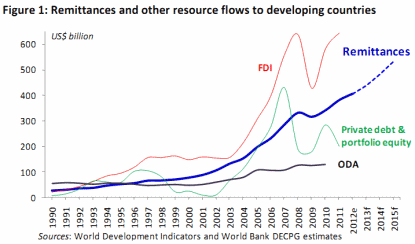♠ Posted by Emmanuel in Credit Crisis,Egypt
at 12/30/2012 08:01:00 AM
Is sound money management a normative activity? I would tend to think so since depreciation, inflation and so on tend to have widespread negative effects on the population's well-being. However, it comes as no real surprise that the Egyptian central bank has taken what are arguably steps on the road to a full-blown economic crisis, namely: (a) rapid currency devaluation and (b) foreign exchange rationing. For our dear Arabic readers, the press release is up on the Central Bank of Egypt website--an, er, exciting place to work in there ever was one.
Reuters has the pertinent details:
There is debate about the meaning of FX rationing so late in the game. It may mean that Egypt does not expect its purported $4.8B IMF bailout deal to be cemented by January, causing it to prepare for the worst. OTOH, it may be the Central Bank of Egypt--still de jure independent the last time I checked--signalling to the fundamentalist crew that things are getting really, really bad. Morsi mentions that Egypt's reserves have been buoyed in recent months, but that's largely down to Arab states lending it some money to tide it over until...the IMF lends it money too? One can only hope.
It's bad news all around...unless you're Morsi's spin doctor, that is.What a shining success, this Arab Spring. As I've said before, more pragmatic sorts will legitimately question if this parlous state of affairs is an improvement in any tangible sense over the Mubarak years.
1/1/2013 UPDATE: Government foreign exchange auctions have not prevented the Egyptian pound from sliding to all-time lows. Market participants can smell Egypt's desperation.
1/3/2013 UPDATE: Still sliding to a new record low of 6.42 to the US dollar.
Reuters has the pertinent details:
Egypt's central bank said it would start foreign currency auctions on Sunday to conserve reserves that have fallen to a critical level, pointing to a deepening economic crisis as President Mohamed Mursi tries to calm political turmoil. The announcement was posted on the bank's website on Saturday just two hours after Mursi used a major policy speech to declare the economy was showing signs of improvement [if this is an improvement...]I would like to wish our Egyptian friends a Happy New Year, but I am afraid that the conditions that have led to this state of affairs are only likely to worsen in 2013. The constitution ramrodded by the fundamentalist leadership is deeply divisive, causing many of the natives to go restless. In turn, widespread turmoil at home is hardly conducive to attracting much-needed FDI or tourists. While the new currency controls may partially be aimed at staunching capital flight, I don't think they will deter those who want to park their money in safer places alike the Dubai.
The central bank has spent more than $20 billion in foreign reserves to support the pound since a mass uprising against Hosni Mubarak in early 2011 chased away tourists and foreign investors...Violent street protests and political wrangling over the last month have prompted a rush by investors and ordinary citizens to switch their Egyptian pounds into foreign currency on concerns the government might devalue or bring in capital controls. The bank allowed the pound to weaken to an eight-year low of 6.188 to the U.S. dollar on Thursday. On Saturday it urged Egyptians to "rationalise their use" of foreign currency and not speculate against the pound.
There is debate about the meaning of FX rationing so late in the game. It may mean that Egypt does not expect its purported $4.8B IMF bailout deal to be cemented by January, causing it to prepare for the worst. OTOH, it may be the Central Bank of Egypt--still de jure independent the last time I checked--signalling to the fundamentalist crew that things are getting really, really bad. Morsi mentions that Egypt's reserves have been buoyed in recent months, but that's largely down to Arab states lending it some money to tide it over until...the IMF lends it money too? One can only hope.
It's bad news all around...unless you're Morsi's spin doctor, that is.What a shining success, this Arab Spring. As I've said before, more pragmatic sorts will legitimately question if this parlous state of affairs is an improvement in any tangible sense over the Mubarak years.
1/1/2013 UPDATE: Government foreign exchange auctions have not prevented the Egyptian pound from sliding to all-time lows. Market participants can smell Egypt's desperation.
1/3/2013 UPDATE: Still sliding to a new record low of 6.42 to the US dollar.













